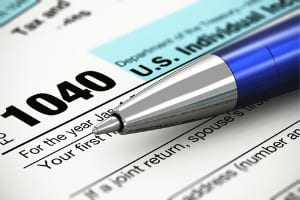IRS Shares Tips on How to Avoid Fraudulent Tax Preparation Services
Tax fraud related to identity theft is a rapidly growing problem. It involves thieves using your personal identifying information to file false tax returns in order to receive big refunds. Thieves can get ahold of your information in any number of ways, such as by finding old paperwork.
But what about when people willingly hand all their information over to fraudsters? According to the Internal Revenue Service, this is happening with increasing frequency.
People looking to scam the IRS out of tax dollars are now opening their own seemingly legitimate tax preparation businesses. The businesses often initiate contact with potential clients by posing as the IRS in emails.
Once clients sign up for phony services, they tend to trust their preparers to file proper returns on their behalf. Consumers often don’t notice false information added to their returns and, as a result, request too-high refunds.
To make sure they get a good chunk of the money, these tax preparers often request that refunds be sent directly to them or they agree to receive a specific percentage of the refund rather than receiving a flat fee. And since they have access to a slew of personal information, including Social Security numbers, they may hold onto information and file more fraudulent returns in the future.
Major Scams Revealed
People engaging in tax fraud aren’t doing it just for a little cash on the side. Some set up elaborate systems with several accomplices, often family members, and take whatever they think they can. The larger scams can regularly steal millions of dollars from the government, while especially crafty individuals have been found to steal hundreds of millions of dollars.
Earlier this month, a professional tax preparer in Alabama was found guilty of filing more than 1,000 fraudulent tax returns and claiming $1.7 million in refunds. She and numerous accomplices kept the scheme going for years leading up to her arrest. She was sentenced to 12 years in prison and was ordered to pay $1.3 million in restitution.
Another recent case involved a group of six fraudsters who filed tax returns for clients nationwide. In all, the group attempted to collect $160 million from more than 380 fraudulent tax returns, mostly for the 2008 tax year. All six were convicted and, in the last month, were sentenced to prison. The longest prison sentence of 25 years went to Michael D. Beiter, Jr., who is serving 10 years for a previous tax fraud scheme.
This case was a bit different since the clients agreed to the fraudulent return filings. They hoped to receive large refunds, which they would share with the preparers. Each client’s requested refund amount was based on his or her financial needs. Most of the requested payouts coincided with clients’ debts like credit cards, mortgages and student loans.
The clients did not face criminal charges but did receive large civil penalties. Most did not collect the refunds they requested. Those who did receive refunds were subject to harsh collection efforts by the IRS.
Kathryn Keneally, assistant attorney general of the Justice Department’s Tax Division, said it best: “Committing and helping others to commit tax fraud is a pretty good plan if your goal is to go to jail.”
Choosing a Tax Preparer
Taxpayers can avoid falling for similar tax fraud schemes by doing their homework before they choose a tax preparer. The IRS provides these basic tips to make sure a tax preparer will do a good job and stay within the law:
- Check qualifications. Your tax return preparer should have a Preparer Tax Identification Number (PTIN). You may also want to ask if he or she is affiliated with any professional organization or attends tax prep classes.
- Check history. Look up your tax preparer with the Better Business Bureau to find out about past disciplinary action and other potential issues.
- Check service fees. Tax preparation services should cost a specific fee or hourly rate. Don’t go to someone who charges a percentage of your refund.
- Check refund delivery information. Make sure your refund will be sent directly to you. It should also be a red flag if your preparer promises to get you a larger refund than anyone else could.
- Check accessibility. Make sure you can contact your tax preparer after you file your return, even after April 15, if questions arise.
- Ask about electronic filing. Any paid tax preparer responsible for more than 10 tax returns must file information electronically unless clients request paper returns.
- Ask about documents. Your tax preparer should require paperwork, such as your W-2.
- Review it. Review all the information on your tax return before you sign and submit it. Make sure your tax preparer has also signed the return and included his or her PTIN. Never sign a blank tax return.
While some tax preparers are just looking to make money off you, there are many more who are skilled and experienced. Finding the right tax preparer can be tough, but it is worth it to protect your information and identity.
Sources:
- Buckner, G. (2013, February 25). How Well Do You Know Your Tax Preparer? Fox Business. Retrieved from http://www.foxbusiness.com/personal-finance/2013/02/25/how-well-do-know-your-tax-preparer/
- Department of Justice, Office of Public Affairs. (2013, February 4). Six Sentenced to Prison in Florida for Federal Tax Crimes. Retrieved from http://www.justice.gov/opa/pr/2013/February/13-tax-150.html
- U.S. Attorney’s Office, Southern District of Florida. (2012, October 29). Four Convicted In $160 Million Nationwide Tax Fraud Scheme. Retrieved from http://www.justice.gov/usao/fls/PressReleases/121029-03.html
- Internal Revenue Service. (2013, February 5). Ten Tips to Help You Choose a Tax Preparer. Retrieved from http://www.irs.gov/uac/Newsroom/Ten-Tips-to-Help-You-Choose-a-Preparer

